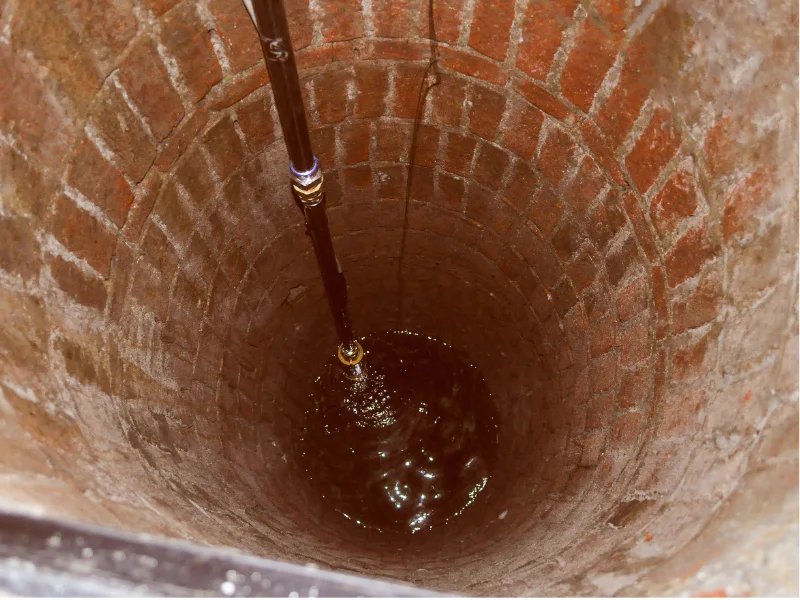There are several signs that may indicate that a deep well is malfunctioning. If you…
Water is one of our planet's most precious resources, essential for sustaining life and supporting countless human activities. As a result, the methods for accessing clean, reliable water supplies are of paramount importance. Two common ways to tap into underground water sources are through deep wells and shallow wells.
Join our Raleigh well service professionals as we explore the difference between deep and shallow wells, helping you understand the key distinctions between them and ultimately make informed decisions when it comes to securing a sustainable water source for your home, farm, or community.
What Are Deep Wells?
Deep wells are groundwater extraction systems that reach substantial depths below the Earth's surface to access water reserves. Deep wells are typically drilled by a trenching contractor or dug to tap into aquifers or underground water tables located at considerable depths, often exceeding 100 feet (30 meters) or more.
Deep Well Depth

The defining characteristic of deep wells is their substantial depth. They extend well below the water table to ensure a consistent and reliable water supply, even during dry seasons. The depth of deep wells can vary significantly depending on geological factors, location, and specific water needs.
Some deep wells may reach depths of several hundred feet or more to access water reserves. The decision on the depth of a deep well is influenced by factors such as water quality, water table levels, and the intended use of the water source.
Construction of Deep Wells
Deep wells are constructed using various methods, including drilling, driven well points, or boreholes. The choice of construction method depends on geological conditions and the depth required.
Deep Well Pumping Systems
Deep wells typically require more robust and powerful deep well pump systems due to the greater distance the water must travel to reach the surface.
Deep Well Water Quality
Water extracted from deep wells tends to be of high quality, as it is naturally filtered as it percolates through layers of rock and sediment.
Understanding the Common Uses of Deep Wells
Deep wells, with their ability to tap into groundwater at substantial depths below the Earth's surface, serve as invaluable resources for a wide range of applications. The reliability and quality of water they provide make them essential in various sectors, including:
- Agriculture: Deep wells are commonly used for irrigation in agriculture, allowing farmers to access water deep below the ground for their crops.
- Municipal Water Supply: Many towns and cities rely on deep wells as a primary source of drinking water for their residents.
- Industrial Applications: Industries often use deep wells for various processes that require a consistent and clean water supply.
- Geothermal Heating and Cooling: Some deep wells are used for geothermal heating and cooling systems, harnessing the Earth's stable temperatures for energy efficiency.
Pros and Cons of Deep Wells
Deep wells offer a dependable solution for securing a consistent water supply. However, like any technological advancement, deep wells come with their own set of advantages and disadvantages that must be carefully considered.
Some benefits of deep wells include:
- Reliable Water Supply
- High Water Quality
- Suitable for Large-Scale Use
- Drought Resistance
- Long Lifespan
In contrast, some of the drawbacks of a deep well system are:
- Higher Initial Cost
- Complex Maintenance
- Environmental Impact
- Regulatory Compliance
- Energy Consumption
- Limited Access
What Are Shallow Wells?
Shallow wells are a type of groundwater extraction system that taps into water sources relatively close to the Earth's surface. Unlike deep wells, which extend to significant depths, shallow wells are typically constructed to access water tables that are relatively shallow, usually at depths of less than 100 feet (30 meters). Shallow wells offer a simpler and more cost-effective solution for obtaining water for various purposes.
Depth of Shallow Wells
Shallow wells are characterized by their limited depth compared to deep wells. They are designed to access water sources located close to the surface. The exact depth of a shallow well can vary depending on factors such as geographic location, local hydrogeology, and water table fluctuations.
It is important to consider the depth and quality of the water source when designing and installing shallow wells to ensure a consistent and reliable water supply. Additionally, proper well maintenance and water quality testing are essential for ensuring the safety and reliability of water from shallow wells.
Shallow Well Construction
Shallow wells can be constructed using various methods, including hand-dug wells, driven wells, or drilled wells, depending on factors like local geology and water table depth.
Shallow Well Pumping Systems
Shallow wells typically use less powerful shallow well pump systems compared to deep wells, as the water source is closer to the surface.
Water Quality of Shallow Wells
Water quality in shallow wells can vary depending on local conditions, and it may be more susceptible to contamination from surface sources.
What Are the Common Uses of Shallow Wells?
Shallow wells offer practical solutions for various water needs. Their accessibility and simplicity make them versatile assets in both rural and urban settings, including:
- Domestic Water Supply: Shallow wells are frequently used as a source of water for residential homes, particularly in rural areas.
- Livestock and Agriculture: Farmers use shallow wells for supplying water to their livestock and for irrigation purposes.
- Small-Scale Commercial and Industrial Use: Some small businesses and industries may use shallow wells for basic water needs.
- Emergency Water Supply: Shallow wells can serve as an emergency water source during temporary water shortages.
Advantages and Drawbacks of Shallow Wells
Shallow wells offer a practical and cost-effective means of accessing groundwater, serving as a vital water source for various applications. However, their advantages come hand in hand with challenges and limitations.
Pros of shallow wells include:
- Cost-Effectiveness
- Quick Installation
- Suitable for Domestic Use
- Versatility
The cons of shallow wells are:
- Depth Limitations
- Water Quality Variability
- Limited Capacity
- Vulnerability to Contaminants
- Shorter Lifespan
- Not Suitable for All Locations
What Are the Key Differences Between Deep and Shallow Wells?

The difference between deep and shallow wells are significant and can impact their functionality, cost, and suitability for specific needs. The key distinctions between deep and shallow wells are outlined below.
Well Depth
Deep wells are characterized by their substantial depth, typically exceeding 100 feet (30 meters) or more below the Earth's surface. Shallow wells, in contrast, tap into water sources relatively close to the surface, usually at depths of less than 100 feet (30 meters).
Water Quality
Water extracted from deep wells tends to be of high quality due to natural filtration processes as it percolates through layers of soil and rock. It is often free from surface contaminants. Water quality in shallow wells can vary depending on local conditions and is more susceptible to well water contamination from surface sources, such as runoff or pollution.
Installation and Maintenance
The installation of deep wells is more complex and typically requires specialized drilling equipment. Maintenance for deep wells, as well as deep well pump repairs, can also be more challenging and costly due to the depth involved. Shallow wells and shallow well pumps are relatively easier to install and maintain. They can often be constructed with simpler methods, and maintenance and repairs are more accessible and cost-effective.
Cost Factors
Deep wells generally require a larger initial investment due to the equipment and expertise needed for drilling to significant depths. Shallow wells are more cost-effective to install initially, making them accessible for smaller-scale applications and individuals with limited budgets.
Environmental Considerations
Deep well drilling can have a more significant environmental impact due to the deeper penetration into the Earth's crust. It may also influence local groundwater dynamics. Shallow well construction typically has a smaller environmental footprint and is less likely to disrupt local aquifers or geological features.
Contact Our Raleigh Well Contractors Today
Whether you are a homeowner seeking a reliable water supply for your family or a business owner looking to meet your commercial water needs, our Raleigh well contractors are here to assist you. We understand the importance of having access to clean and consistent water, whether from deep wells or shallow wells.
Our experienced team from A&T Well and Pump is ready to provide expert guidance, installation, video well inspections, and maintenance services tailored to your residential or commercial property.
Contact us now by calling (919) 980-0981 or filling out the form below to get started.
Contact Form
We would love to hear from you! Please fill out this form and we will get back to you shortly.
"*" indicates required fields

